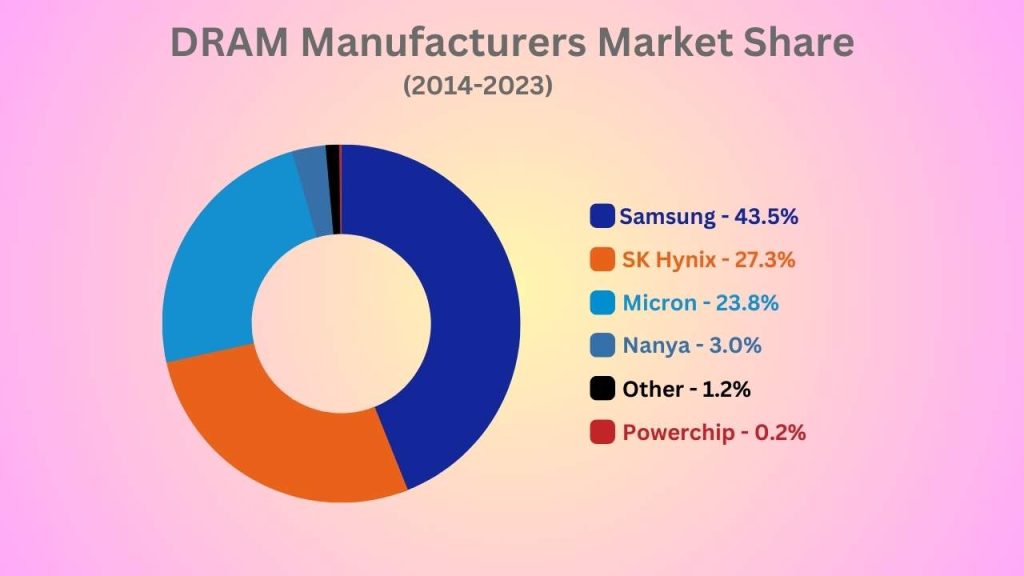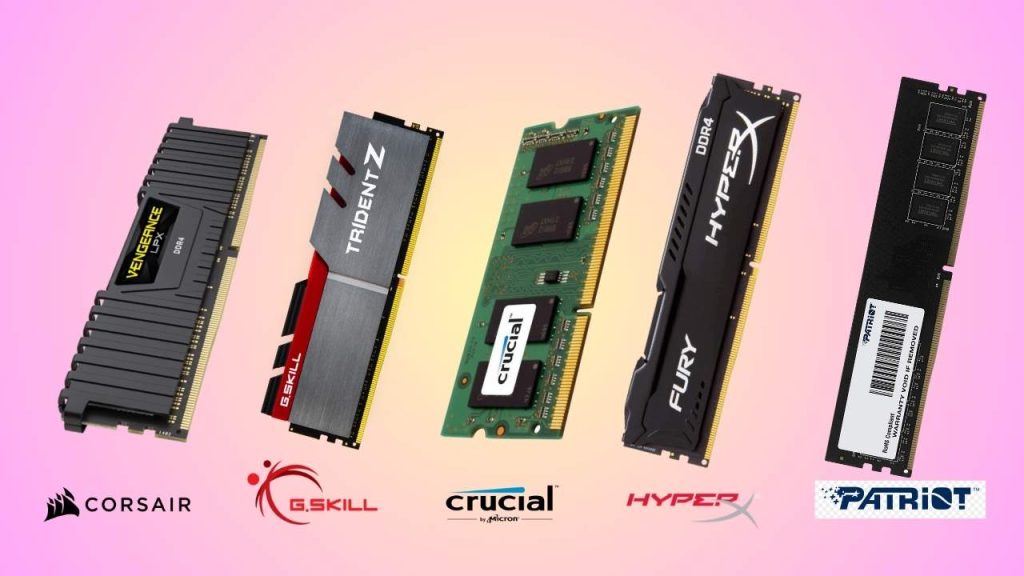Meta Description: When building a new PC, one key question is does RAM brand matter for performance? The answer is not as complicated as you may think.
When putting together your dream PC build, one of the key components you’ll need to choose is the RAM (random access memory). With so many brands of RAM on the market like Corsair, G.Skill, Crucial, and Kingston, you may be wondering – does the brand really matter?
The short answer is No, the RAM brand itself makes little to no difference in performance as long as the specs are the same.
However, going with a well-known brand does offer some advantages other than flashier RGB lighting options. While raw performance between RAM brands is similar, this article will dive into the key differences between brands and discuss what you should look for when selecting the best RAM for your new PC. The goal is to help you make an informed decision so you can get the right RAM to match your build and budget.
Does RAM Brand Matter?
When choosing RAM for your custom PC build, you’ll see lots of different brands like Corsair, G.Skill, Kingston, etc. But does the brand really impact performance? In short – not really. RAM from the major brands is often sourced from the same few manufacturing plants. As long as the specs like speed, timing, and capacity are the same, RAM will deliver similar real-world performance regardless of brand name. However, brands can impact other factors like cost, aesthetics, lighting, customer service, and warranty length.
RAM Manufacturer
Behind those brand names on your RAM stick, only three companies actually manufacture around 95% the memory modules – Samsung, SK Hynix, and Micron. So even if you go with a less mainstream brand, the RAM itself is likely coming from one of those major manufacturers. This means performance differences between brands are negligible when specs are equal.

Proper Advertised Product
If the specs like speed, timing, voltage, and capacity are advertised accurately, RAM will meet expectations regardless of brand. So focus on finding RAM that matches your builds’ needs and budget rather than fixating on brand names.
Brand Doesn’t Impact Performance
RAM brand has minimal impact on real-world speed and performance. Factors like chip architecture, speed grade, timings, and testing methodology make far more difference than the name on the package.
What to Look for When Buying RAM?
When selecting RAM, the brand name alone shouldn’t be the deciding factor. Here are a few key things to consider beyond specs like speed and capacity when choosing the right RAM for your build.

Warranty and Returns
A strong warranty and return policy can provide peace of mind, especially with PC components. Well-known brands often have an advantage here as they have a reputation to uphold and widely documented policies. With less mainstream brands, it may be unclear if they stand behind their products post-purchase. So check what warranty and return options are available before buying any RAM.
Quality Assurance and Testing
Mainstream RAM brands have more incentive and resources to rigorously test sticks before they reach consumers. They may bin and modify RAM chips further too. With smaller brands, quality control practices may be more of an unknown.
Distinguishing High-End RAM
If seeking out top-tier RAM for extreme overclocking or maximizing Ryzen performance, prominent brands give you more choices for high-binned ICs and optimizations like Samsung B-Die. So brand can matter more for RAM at the cutting edge, where extensive testing and product stacking are assets.
Does RAM speed really matter?
When assembling your PC, you’ll inevitably be tempted by those ultra-fast RAM kits boasting speeds of 3600MHz or more. But does chasing the highest megahertz really impact performance? The answer is it depends. RAM speed does impact your system, but only up to the maximum your CPU supports.
For example, AMD’s Ryzen 9 5950X officially supports up to 3200MHz DDR4 RAM. Going beyond that provides no extra benefit. The key is matching your RAM speed to your processor’s capabilities. Slower RAM can bottleneck performance, but ultra-fast RAM won’t accelerate things if your CPU can’t leverage it. Focus on finding the sweet spot for your build.
What Actually Impacts RAM Performance?
When comparing RAM options, you’ll see specs like speed/frequency, timings, voltage, and more. But what makes the biggest difference in real-world use? The most important factor determining RAM performance is the clock speed, measured in megahertz (MHz). Faster clock speeds enable higher data transfer rates.

Currently DDR4 RAM runs from 2133MHz to 4266MHz, while new DDR5 can reach over 8000MHz. The higher the clock speed, the better performance you’ll see, especially in bandwidth-hungry tasks.
But clock speed isn’t everything. Timings, expressed as CAS Latency, affect responsiveness – lower is better. The chip architecture and internal design impact speed too. And don’t forget capacity – more RAM allows handling larger workloads.
So, when choosing RAM, consider the combo of speed grade, timings, architecture, and capacity. Brand alone means little, but it’s what’s under the heat sink that counts. Focus on the specs that fit your build rather than fixating on brand names.
Can You Use Different Brands Of RAM?
When upgrading your PC’s memory, you may be tempted to save money by mixing and matching RAM sticks from different brands. But is this a good idea for system stability and performance?
The short answer is you can combine RAM from different brands, but it carries risks.
For stable operation, the clock speed, timings, voltage, CAS latency and other specs must match exactly. Even then, variations in manufacturing and quality control between brands can cause compatibility issues. Your system will likely default to the slower speed if they differ.
To avoid headaches, it’s best to match the brands and models throughout your RAM configuration. The safest route is buying a full kit together, even if upgrading later. While mixing RAM is possible, unpredictability in compatibility makes it an unstable solution.
So, for a smooth experience, stick to one trusted brand and uniform specs when populating your RAM slots.
Cheap vs Expensive RAM: Which one should you buy?
When buying RAM, you’ll see options ranging from budget-friendly to premium-priced. But does splurging on more expensive RAM actually impact performance? Generally, No – most RAM performs similarly when specs like speed, timing, and voltage match. The extra cost of high-end RAM goes towards non-essential features like flashy RGB lighting, aggressive heat spreaders, and premium aesthetics. These don’t affect speed but do enhance looks.
More expensive RAM may also boast extensive factory testing and quality checks. However, baseline compatibility and reliability should be comparable between budget and high-end kits. Ultimately, your CPU matters more than the RAM brand. Avoid super cheap no-name RAM, but mid-range sticks will work fine for most.
Consider spending more if overclocking or wanting specific high-binned ICs. Otherwise, affordable RAM provides the best bang for buck. Focus on capacity and matching your platform’s speed support rather than paying huge premiums for looks and brand cachet.
What Are The Best RAM Brands?
When buying RAM, these brands stand out for quality, performance, warranty coverage, and customer service:
- Corsair – A top name in PC components, Corsair RAM offers extensive compatibility, RGB bling, and lifetime warranties backed by top-notch customer service. Their wide selection ensures you’ll find the right RAM for your build.
- G.Skill – Renowned for rigorous testing and Samsung ICs, G.Skill RAM delivers excellent reliability and overclocking potential. Warranties and customer service provide peace of mind.
- Crucial – As a Micron subsidiary, Crucial gets early access to quality RAM chips. Their affordable yet reliable DIMMs are a solid budget-friendly choice.
- Kingston/HyperX – Boasting broad compatibility, HyperX gaming RAM meets demanding needs while Kingston’s lifetime warranties protect your investment.
- Patriot – With very reasonable prices but less latency tuning, Patriot’s Viper RAM focuses on value. Their lifetime warranties add appeal.

While performance differences are minimal, these major brands inspire confidence. For worry-free RAM that matches your build, they offer quality, stability, and support.
Wrapping Up
When it comes to RAM, the brand name alone doesn’t tell the full story. While prominent brands boast excellent customer service and flashy premium features, baseline performance and reliability are comparable across most major manufacturers.
The RAM market is surprisingly uniform – sourced from just a handful of plants before being repackaged under dozens of brand names. At the end of the day, your build’s capabilities matter far more than the label on the RAM stick. Focus on finding dual in-line memory modules (DIMMs) with specs that match your platform rather than paying a premium solely for brand cachet.
For most users, moderately priced RAM from a major brand will provide all the speed and stability needed for a high-performing, glitch-free system.







